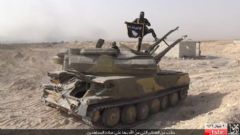Human Rights Voices
While the UN devotes its human rights operations to the demonization of the democratic state of Israel above all others and condemns the United States more often than the vast majority of non-democracies around the world, the voices of real victims around the world must be heard.
Islamic State, August 14, 2015
Islamic State Used Chemical Weapons On Kurds
Original source
Islamic State fighters have been accused of using chemical weapons against Kurdish forces in northern Iraq.
Peshmerga fighters said rockets filled with chlorine gas were used during an attack on Wednesday, near the town of Makhmour, near Irbil.
Germany, which helping training the Kurds, told the Wall Street Journal that about 60 Iraqi Kurdish fighters had "suffered injuries to their throats consistent with a chemical attack while fighting Islamic State".
Germany's Federal Ministry of Defence confirmed Iraqi and US experts were heading to the scene of the attack to investigate.
US officials described the claims as "plausible" said there was "credible information" mustard gas was used.
It was suggested IS could have obtained the gas in Syria, which admitted having the agent when it agreed to give up its chemical weapons.
The group controls large areas of Syria and Iraq.
The Pentagon has said it was looking into the claims, with spokesman Navy Captain Jeff Davis adding: "We continue to take these and all allegations of chemical weapons use very seriously."
The first large-scale use of mustard gas was by the German army at Ypres in 1915, when thousands of canisters were released along the four-mile front, creating a wind-borne chemical cloud that opened a breach in the lines of unprepared French and Algerian troops.
The asphyxiant has been banned in war by the UN since 1993.
The claims came as it emerged the US bombing campaign against IS had stepped up in July.
Lieutenant Commander Kyle Raines, a spokesman for UUS Central Command, said the number of bombs and other munitions used in July increased by 67% over the previous month, jumping from 1,686 to 2,829.

